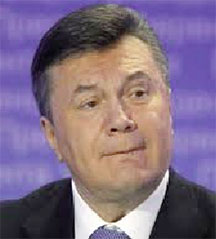KIEV, (Reuters) – Ukrainian President Viktor Yanukovich said he had reached agreement with opposition leaders on a “truce” to halt fighting that has killed 26 people, even as the United States stepped up pressure by imposing travel bans on 20 senior Ukrainian officials.

A statement on the presidential website announced an accord for “the start to negotiations with the aim of ending bloodshed, and stabilizing the situation in the state in the interest of social peace.”
Responding cautiously, U.S. President Barack Obama deemed the truce a “welcome step forward,” but said the White House will continue to monitor the situation closely to “ensure that actions mirror words.”
A tense stand-off between protesters and riot police continued last night in Kiev, where the foreign ministers of France, Germany and Poland will later meet Yanukovich before returning to Brussels for a meeting of all 28 European Union foreign ministers to decide on targeted sanctions against those deemed responsible for the violence.
Yanukovich, backed by Russia, had denounced the bloodshed in central Kiev, where protesters have been dug in for almost three months since he spurned a trade deal with the European Union in favor of closer Russian ties, as an attempted coup.
His security service said it had launched a nationwide “anti-terrorist operation” after arms and ammunition dumps were looted.
The violence, the worst since Ukraine’s independence from the Soviet Union 22 years ago, provoked a chorus of condemnation from the West.
EU ambassadors discussed a series of possible steps including asset freezes and travel bans in talks on Wednesday, even though some diplomats have doubts about the effectiveness of such sanctions.
“The European Union will respond to the deterioration on the ground, including via targeted measures,” European Council President Herman Van Rompuy said in a statement, while holding out the possibility of trade and political agreement with Ukraine if it meets goals agreed with the EU.
Jumping out ahead of its EU allies, Washington late on Wednesday imposed U.S. visa bans on 20 Ukrainian government officials it considered “responsible for ordering human rights abuses related to political oppression,” a senior State Department official said.
“These individuals represent the full chain of command we consider responsible for ordering the security forces to move against” the protesters, the official said.
While declining to name those affected by the bans, which bar them from applying for visas to travel to the United States, the U.S. official said the restrictions were easily reversible if the situation improved.
While EU officials said they were considering targeted sanctions for the “unjustified use of excessive force by the Ukrainian authorities,” they noted Yanukovich himself would be excluded from such measures in order to keep channels of dialogue open.
As well as asset freezes and visa bans, ministers will discuss measures to stop riot gear and other equipment being exported to Ukraine and could consider arms restrictions.
The United States, going head to head with Russia in a dispute heavy with echoes of the Cold War, had urged Yanukovich to pull back riot police, call a truce and talk to the opposition. But Washington appears to have little direct leverage in the crisis.
Despite that, the Obama administration has invited the leaders of Georgia and Moldova to visit Washington in the next two weeks, congressional aides said on Wednesday, in what appeared to be an effort to show U.S. support for neighbors of Russia concerned about the crisis in Ukraine.
While attending a North American summit in Mexico, Obama called on Ukraine’s armed forces to stay out of the conflict and warned there would be consequences for those who “step over the line.” The Pentagon said Ukrainian military intervention would harm “our defense relationship.”
